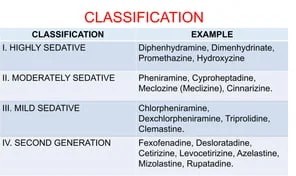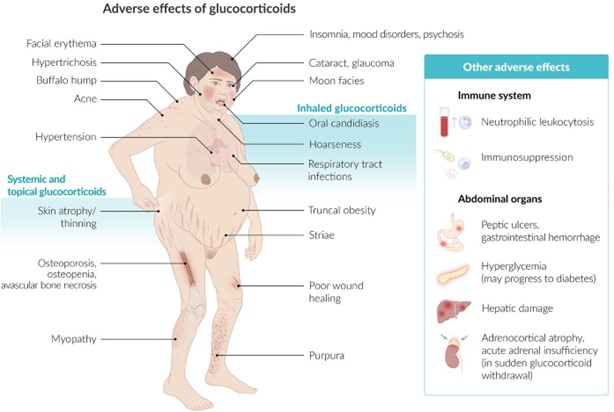Loratadine (Claritin) has an advantage over traditional antihistamines such as diphenhydramine (Benadryl) in that loratadine has
Less sedative effect.
Increased bronchodilating effects.
Less risk of cardiac arrhythmias.
Less gastrointestinal upset.
The Correct Answer is A
Traditional antihistamines like diphenhydramine are known to have sedating properties, which can cause drowsiness and impair cognitive function. On the other hand, loratadine is classified as a non-sedating or second-generation antihistamine. It is designed to have less of a sedative effect, allowing individuals to take it during the day without experiencing significant drowsiness or impairment.

It is important to note that individual responses to medications can vary, and some individuals may still experience mild drowsiness with loratadine. However, compared to diphenhydramine, loratadine is generally associated with a lower risk of sedation.
Nursing Test Bank
Naxlex Comprehensive Predictor Exams
Related Questions
Correct Answer is C
Explanation
White coating in the mouth: A white coating in the mouth could be a sign of a fungal infection such as oral thrush. Fluticasone, which is a corticosteroid, can increase the risk of developing fungal infections. Therefore, the nurse should instruct the client to report any signs of oral thrush or other unusual changes in the mouth, such as white patches or discomfort, to the provider.
Prompt identification and treatment of oral thrush are necessary to prevent its progression and ensure effective management of the client's condition.
Dry oral mucous membranes: Dry oral mucous membranes are not typically associated with fluticasone/salmeterol use. However, if the client experiences persistent or severe dryness in the mouth or any other unusual oral symptoms, it should be reported to the provider. Dry mouth can sometimes occur as a side effect of medications or indicate other underlying issues that need to be addressed.
Sedation: Sedation is not a common side effect of fluticasone/salmeterol. If the client experiences excessive drowsiness or sedation that interferes with their daily activities, it may be important to report this to the provider. While sedation is not a typical adverse effect of this medication, individual responses can vary, and it is essential to ensure appropriate monitoring and management.
Increased appetite is not typically associated with fluticasone/salmeterol use. It is not a commonly reported adverse effect of the medication. However, if the client experiences significant and unexplained changes in appetite that are concerning or persistent, it may be worth mentioning to the provider during a follow-up appointment or as part of ongoing monitoring.

Correct Answer is C
Explanation
Acetaminophen overdose can cause liver damage, and acetylcysteine is used as an antidote to prevent or minimize the liver injury caused by acetaminophen toxicity. Acetylcysteine works by replenishing glutathione, a substance that helps neutralize the toxic byproducts of acetaminophen metabolism in the liver.
It is important to note that acetylcysteine is specifically indicated for acetaminophen overdose and may not be effective or appropriate for overdosage of other drugs, such as ibuprofen, diphenhydramine, or amoxicillin.

Whether you are a student looking to ace your exams or a practicing nurse seeking to enhance your expertise , our nursing education contents will empower you with the confidence and competence to make a difference in the lives of patients and become a respected leader in the healthcare field.
Visit Naxlex, invest in your future and unlock endless possibilities with our unparalleled nursing education contents today
Report Wrong Answer on the Current Question
Do you disagree with the answer? If yes, what is your expected answer? Explain.
Kindly be descriptive with the issue you are facing.
